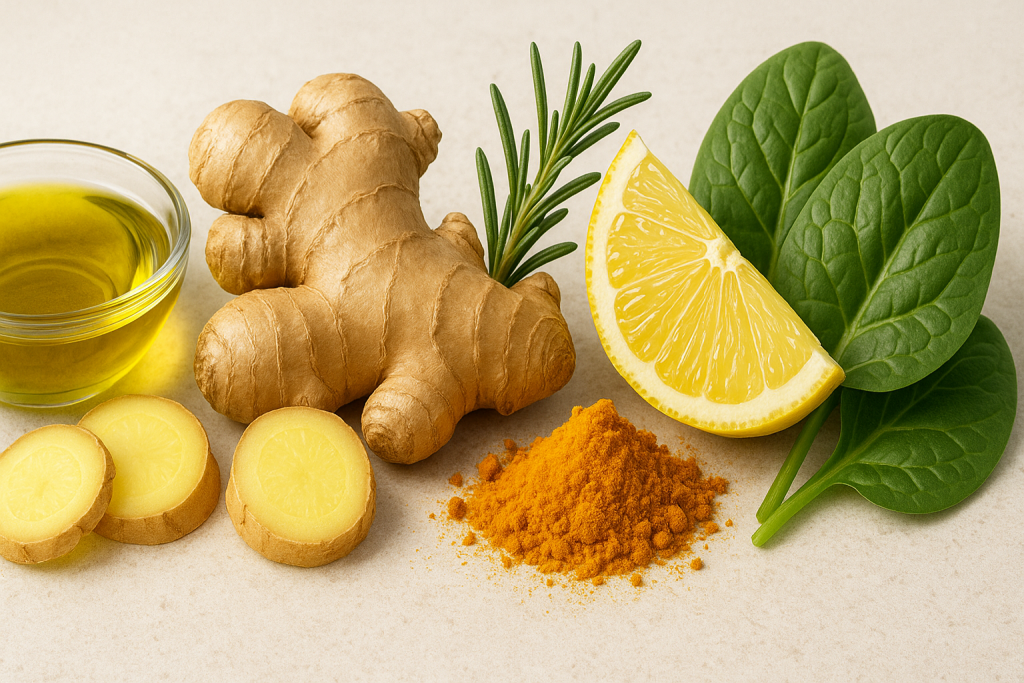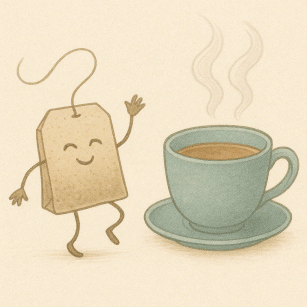
Why am I always so bloated and tired?”
Ever found yourself snapping at the dog, rubbing your knees, or staring at your bloated belly after a light lunch—and thinking, What is wrong with me today? Don’t worry, you’re not unraveling.
You might just be inflamed.
Inflammation is your body’s way of saying, “Oi! Something’s not right in here!” And while it can be helpful in small doses, like fighting off a cold or healing a cut, chronic inflammation is a silent mischief-maker—linked to everything from fatigue and joint pain to heart disease and even brain fog¹.
“Did you know… chronic inflammation is now recognised as a root cause in 7 out of 10 leading causes of death globally?”
Before you panic, grab your cuppa. We’re about to unpack what inflammation really is, what keeps it burning, and how simple, natural steps—from the herbs in your cupboard to a better night’s sleep—can help you fight back.
🔍 What Is Inflammation, Really?
Imagine your immune system like a fire brigade. Inflammation is the water cannon—it rushes in to contain damage when your body senses an invader (like bacteria) or injury (like a twisted ankle). This acute inflammation is short-lived and helpful.
But sometimes the fire brigade doesn’t get the memo to stand down. The water keeps flowing—even when there’s no fire. That’s chronic inflammation, and over time, it wears down your body’s tissues instead of helping them.
Common signs of chronic inflammation:
- Bloating or digestive issues
- Persistent fatigue or poor sleep
- Brain fog or forgetfulness
- Skin flare-ups (eczema, acne)
- Frequent infections or slow healing
- Achy joints or stiffness
“Chronic inflammation may be happening inside you even if you don’t feel ‘sick’.”
🧨 What Keeps the Fire Burning?
Your lifestyle may be unknowingly pouring petrol on the flames. Let’s look at the usual suspects.
🚩 Ultra-Processed Foods
Those £1 sausage rolls and microwave curries? They’re often high in omega-6 oils, sugar, and additives that irritate your gut and immune system².
😴 Poor Sleep
One late Netflix binge might not hurt—but long-term poor sleep raises cortisol, a stress hormone that fans inflammatory flames³.
🧠 Chronic Stress
Ever noticed flare-ups when life gets hectic? That’s because your body interprets stress like a threat—and responds with inflammation⁴.
🧂Toxin Load
Pesticides, plastic chemicals (like BPA), and heavy metals sneak into our food, air, and receipts—triggering inflammatory immune reactions⁵.
🚫 Sedentary Lifestyle
Moving too little causes poor circulation, weight gain, and insulin resistance—all buddies of inflammation.
“You don’t need to run marathons—but sitting 10+ hours a day is like sending an engraved invite to inflammation.”
🌿 Natural Ways to Calm Inflammation—That Actually Work
No injections, no scary pills. Just nature’s pantry, your sofa, and a little bit of common sense.
1. Eat the Anti-Inflammatory Rainbow
Your plate is your first pharmacy.
“The more colour on your plate (from plants, not Skittles), the more anti-inflammatory protection you’re getting.”
Top Foods to Embrace
- Leafy greens (spinach, kale): rich in chlorophyll and antioxidants
- Berries: packed with flavonoids and vitamin C
- Oily fish (mackerel, sardines): full of omega-3s, a natural inflammation tamer⁶
- Turmeric + black pepper: a golden duo for reducing inflammatory markers⁷
- Garlic & onions: natural immune modulators
- Green tea: contains EGCG, which fights inflammation at the cellular level⁸
Tip: Want to try something new this Spring Bank Holiday? Ditch the fry-up and try smashed avocado with turmeric-poached eggs and a green tea spritzer. Fancy! 😎
🌱 2. Herbal Helpers
The herb shelf isn’t just for garnishing roast potatoes.
Best herbs for inflammation:
- Ginger: blocks inflammatory compounds, helps with pain⁹
- Turmeric: contains curcumin, a powerful anti-inflammatory⁷
- Boswellia: used in Ayurvedic medicine for joint pain
- Holy basil (tulsi): reduces stress-related inflammation¹⁰
- Green nettle: rich in minerals and historically used to treat arthritis
“In one study, turmeric performed as well as ibuprofen in easing arthritis symptoms—but without gut irritation⁷.”
🛁 3. Detox Gently, Not Dramatically
Your liver is your detox champion, but give it a little help.
Gentle detox tricks:
- Start your morning with warm lemon water
- Add milk thistle or dandelion root to your tea rotation
- Switch to natural deodorants and cleaners
- Say no to thermal paper receipts (they contain BPS—an inflammatory chemical)
“That receipt you grabbed at Tesco might be doing more than recording your purchase…”
(Don’t believe us? Read our post on BPA/BPS in receipts!)
😴 4. Prioritise Sleep Like It’s a Superpower
7–9 hours isn’t just for babies.
Lack of sleep = more cytokines = more inflammation.
Sleep-boosting habits:
- Dim lights after 9pm
- No screens in bed (yes, even “just checking messages”)
- Herbal sleep teas: chamomile, valerian, passionflower
- A hot magnesium-rich Epsom salt bath before bed

“If your kettle could talk, it’d remind you that chamomile isn’t just for nan—it’s your anti-inflammation ally.”
🧘🏽♀️ 5. Move Your Body—Gently and Joyfully
Forget beast-mode. Just move.
Aim for:
- 30 mins walking daily
- Gentle yoga (check out “Yoga with Adriene”)
- Stretching during ad breaks
- Dancing around your kitchen while cooking (counts, honestly)
“Movement flushes out stagnant lymph, increases circulation, and tells inflammation it’s not welcome here.”
🧘 6. De-Stress Like a Monk (or as close as you can)
Chronic stress = chronic inflammation.
De-stress tips you’ll actually enjoy:
- Try 5-minute breathing exercises (look up “box breathing”)
- Journal what’s on your mind before bed
- Laugh—no, really. Laughter lowers inflammatory markers¹¹
- Book a staycation in nature. Forests lower stress hormones².
There’s a reason you feel better after a walk in Peak District than a scroll through Twitter. 🌲
📥 Want to Take Action?
Download your Natural Wellness Starter Guide
or visit the Quidian Naturals Recipes page where you’ll also find easy recipes to incorporate these herbs into your daily life.
Conclusion: Cool the Fire, Feel the Difference
Inflammation doesn’t have to rule your life. Whether you’re battling low energy, weird skin flare-ups, or just want to feel clearer and lighter—nature’s toolkit is ready and waiting.
You don’t need fancy detoxes, imported superfoods, or a monk’s discipline. You just need to listen to your body, feed it what it loves, and take small steps every day toward a calmer, clearer you.
So go on—brew that turmeric tea, get to bed early tonight, and take a little walk under the sky. Your body will thank you.
👉 Follow @QuidianNaturals for more science-backed, herb-powered health tips!
References
- Berk, L., et al. (2001). The neuroendocrine and stress hormone changes associated with mirthful laughter. Alternative Therapies in Health and Medicine. https://pubmed.ncbi.nlm.nih.gov/11810043/
- Furman, D., et al. (2019). Chronic inflammation in the etiology of disease across the life span. Nature Medicine. https://www.nature.com/articles/s41591-019-0675-0
- Monteiro, C. A., et al. (2019). Ultra-processed products are becoming dominant in the global food system. Obesity Reviews. https://onlinelibrary.wiley.com/doi/full/10.1111/obr.12890
- Irwin, M. R. (2015). Why sleep is important for health: A psychoneuroimmunology perspective. Annual Review of Psychology. https://doi.org/10.1146/annurev-psych-010213-115205
- Black, D. S., & Slavich, G. M. (2016). Mindfulness meditation and the immune system. Annals of the New York Academy of Sciences. https://doi.org/10.1111/nyas.12998
- Rochester, J. R. (2013). Bisphenol A and human health: A review of the literature. Reproductive Toxicology. https://doi.org/10.1016/j.reprotox.2013.08.008
- Calder, P. C. (2017). Omega-3 fatty acids and inflammatory processes: From molecules to man. Biochemical Society Transactions. https://doi.org/10.1042/BST20160474
- Daily, J. W., et al. (2016). Efficacy of turmeric extracts and curcumin for alleviating the symptoms of joint arthritis. Journal of Medicinal Food. https://doi.org/10.1089/jmf.2016.3705
- Yang, C. S., et al. (2009). Cancer prevention by tea: Animal studies, molecular mechanisms and human relevance. Nature Reviews Cancer. https://doi.org/10.1038/nrc2641
- Mao, Q. Q., et al. (2019). Anti-inflammatory effects of ginger: A review. Natural Product Communications. https://doi.org/10.1177/1934578X19850374
- Cohen, M. M. (2014). Tulsi – Ocimum sanctum: A herb for all reasons. Journal of Ayurveda and Integrative Medicine. https://doi.org/10.4103/0975-9476.146554
